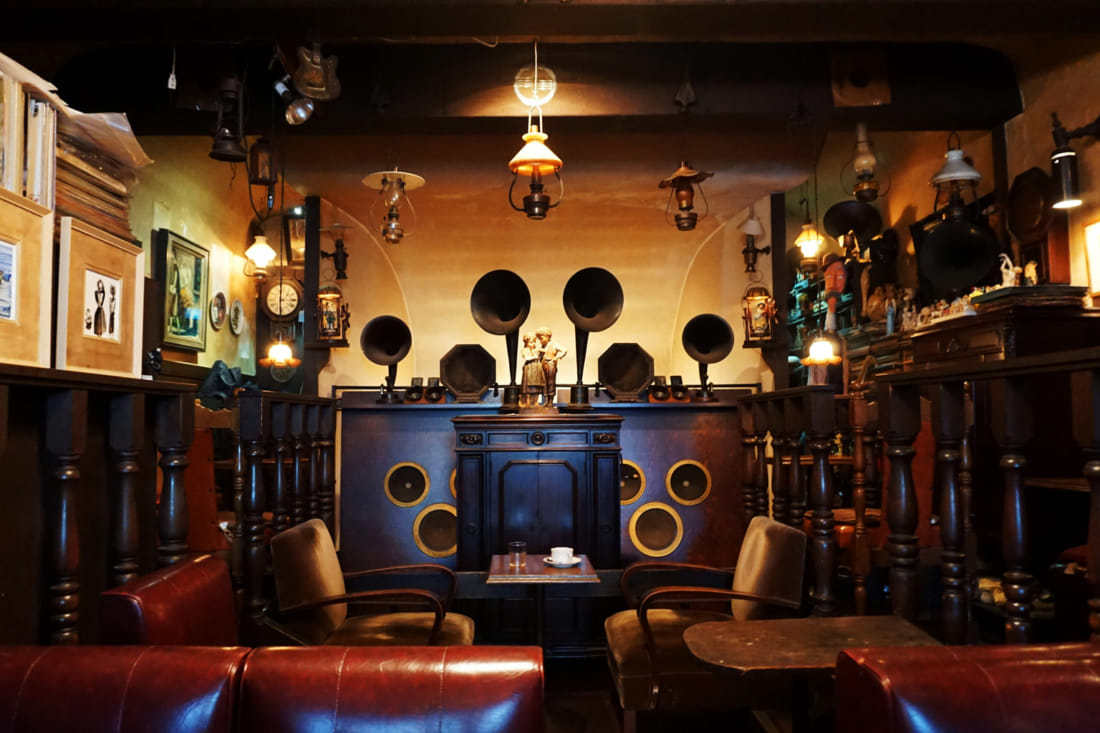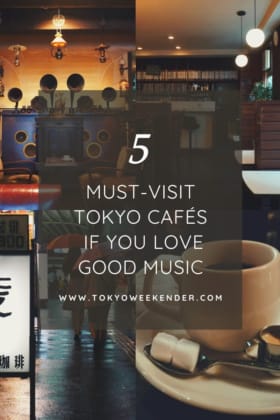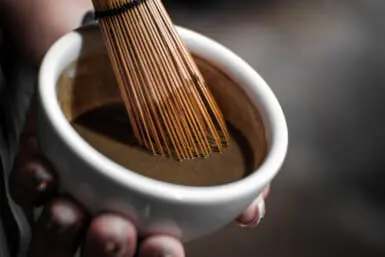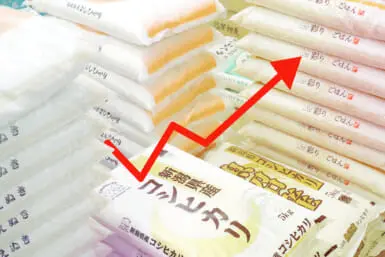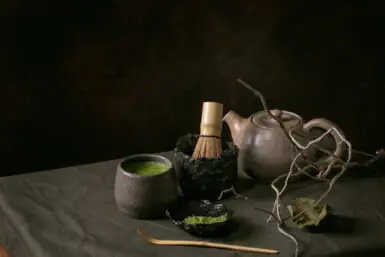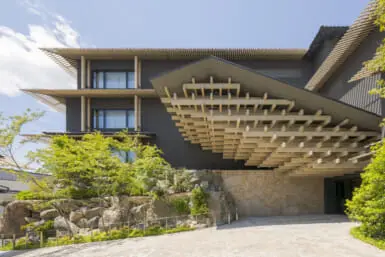Tokyo’s café culture is a reflection of the capital’s dichotomous nature. Ultra-modern, third-wave coffee shops with bare concrete floors and minimalist interiors seem to pop-up weekly in Tokyo’s trendiest neighborhoods, but hidden in unassuming buildings and dimly lit basements you can still find a few remaining meikyoku kissa.
The Japanese term meikyoku kissa is a portmanteau of the words meikyoku and kissaten which mean “masterpiece” and “café.” These cafés are dedicated to the experience of listening to music. They feature custom hi-fi audio systems on which classical music is played, and, in order to preserve the sonic experience, speaking loudly and using cameras or mobile phones is generally prohibited.
Meikyoku kissa were particularly popular after the Second World War when listening to LPs was both difficult and expensive. Now meikyoku kissa serve as places where you can enjoy music as it was meant to be heard. Rather than having music play from your smartphone into one ear while a cacophony of announcements, alarms, and other train sounds constantly interrupt, customers at meikyoku kissa can enjoy the music with only the occasional crackle or pop from the café’s warm analogue system.
Here are five of Tokyo’s notable meikyoku kissa.
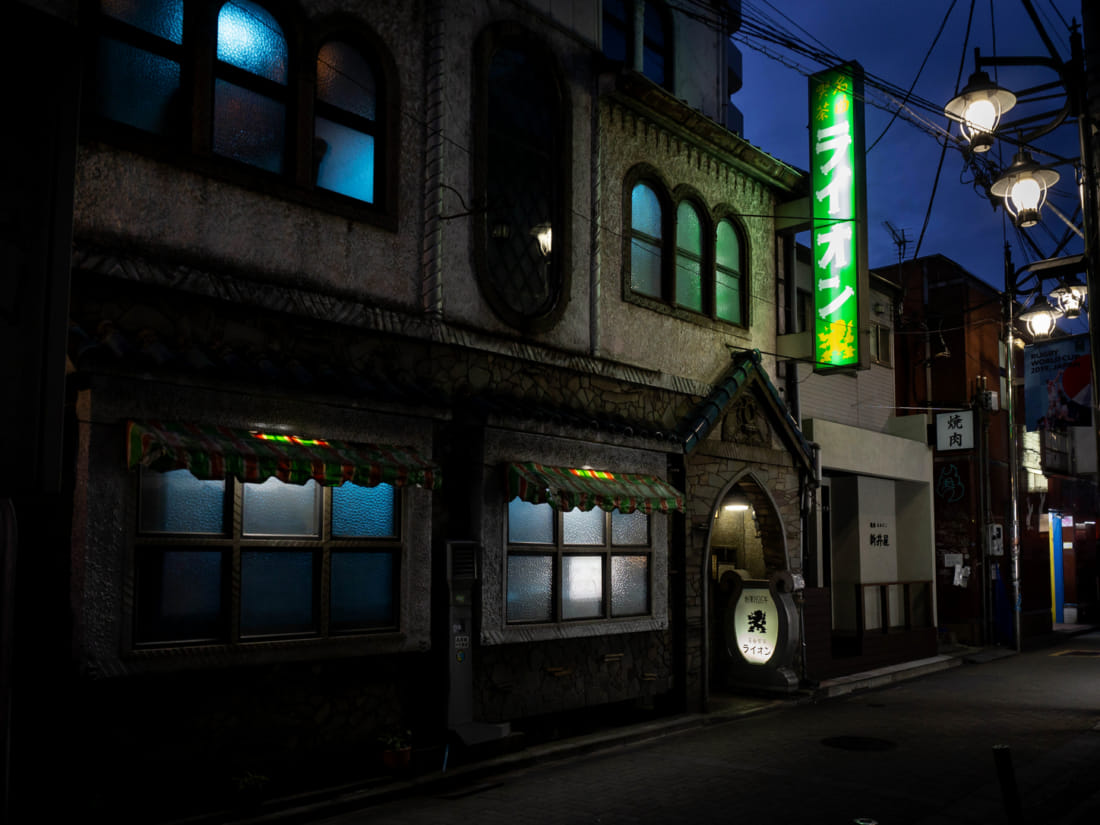
Lion
Lion is the oldest and most well-known of the remaining meikyoku kissa. Lion was originally built in Shibuya in 1926, but the building that stands today was rebuilt in 1950 after the first location was destroyed during the air raids of Tokyo.
The atmosphere and decor of the interior are church-like. The red velvet seats face the front of the establishment like pews to offer listeners the best possible sound, and the turntable serves as the establishment’s altar. The rear wall features a towering 3-meter-tall wooden speaker system specially designed by Pioneer that resembles a church organ as it reaches up to the vaulted ceiling. Placed around the interior are many cabinets stacked with Lion’s collection of over 5,000 records.
Like all meikyoku kissa, the coffee is strong and dark and its flavor is enhanced by the dim lighting, the smell of stacks of records and the warm and clear sound emanating from the beautiful analog system.
As Tokyo’s oldest meikyoku-kissa, it is one of the best to visit first. With its history, ambience, sound quality and decor, it is no wonder why this is Tokyo’s most popular masterpiece cafe.
Find details on our Concierge listing
Violon
Like many of Tokyo’s remaining meikyoku kissa, Violon is located in western Tokyo along the Chuo line. Violon is about a five-minute walk past all of the izakaya, restaurants and other nightlife spots near Asagaya Station.
While Violon opened in 1980, it feels much older. It is filled with antiques and an eclectic arrangement of light fixtures and decor. Violon is much smaller and more intimate than Lion. It seats about 10 people in a sunken portion in the center of the room and there are a few seats along the walls. While the art, decor and ornamental wooden banisters add to the vintage spirit inside Violon, it is the speaker system resembling Victorian era steam machinery that immediately catches your eye and serves as a centerpiece.
Both the staff and clientele of Violon add to the establishment’s charm; you can expect to be welcomed by a warm smile and a whispered greeting by the lone employee. Other patrons might be reading, eating a sweet dessert or even dozing off to the warm classical soundwaves.
Find details on our Concierge listing
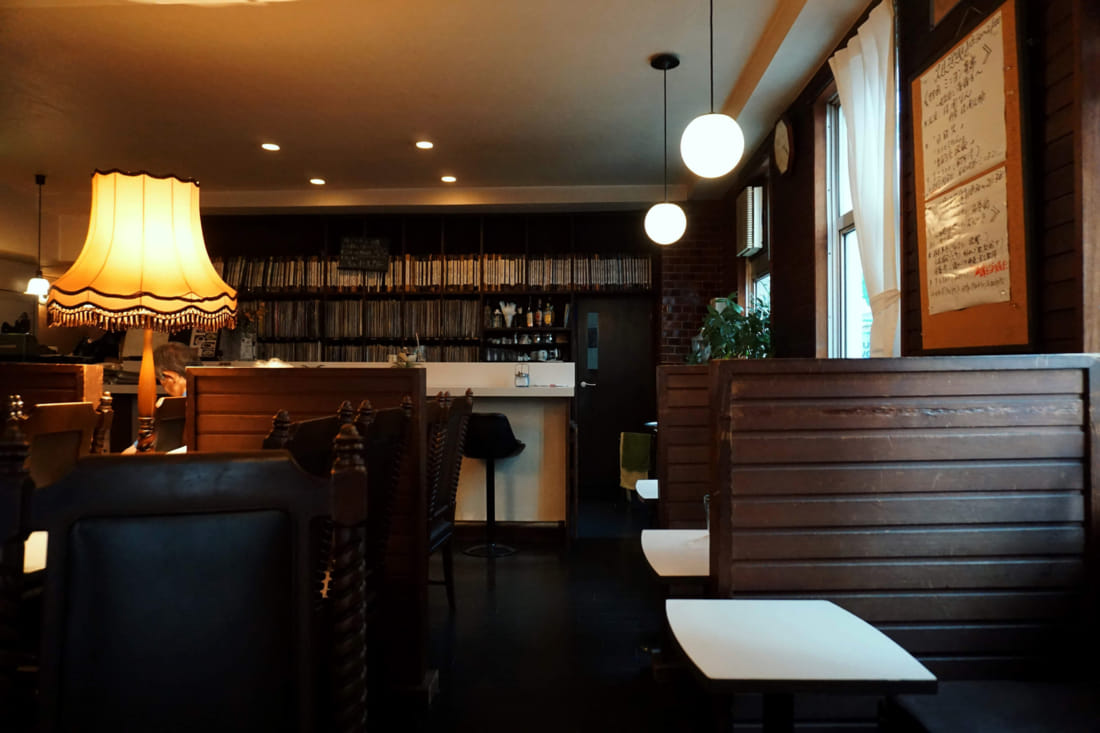
Mignon
Mignon is another Chuo line meikyoku kissa; however, unlike the charmingly cluttered Lion and Violon, it feels clean and organized with purposeful decorations. Mignon is on the second floor of an unassuming building a few minutes from Ogikubo Station.
Being on the second floor, Mignon is pleasantly bright and airy inside. The furniture and decor work to create a cohesive and well-conceived mid-century design. It is spacious and more akin to a modern café than the other establishments on this list.
The audio quality here is exceptionally clear and the shop’s owner takes care to make sure the records sound their best. The no-talking expectation found at other meikyoku-kissa doesn’t seem present here as the owner is happy to chat with customers at the café’s bar seating. This gives Mignon a more relaxed feeling where you don’t have to feel guilty about making a little too much noise when setting your coffee cup back on its saucer or while eating a piece of the shop’s fresh homemade cake.
Find details on our Concierge listing
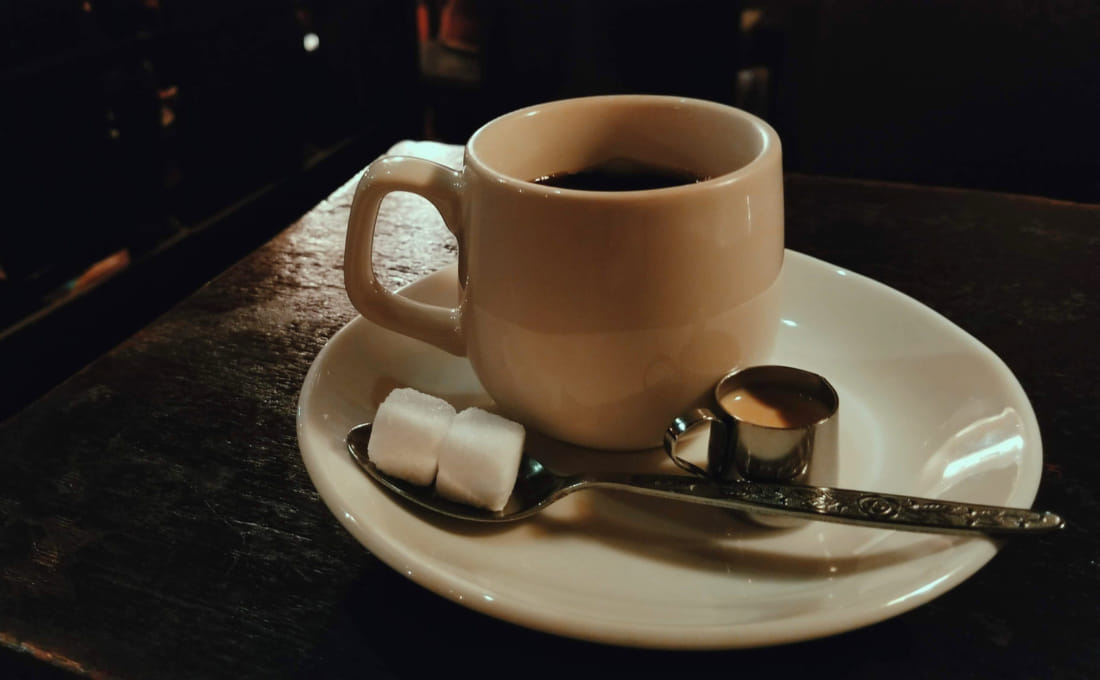
Renaissance
Having opened only about 10 years ago, Renaissance is the newest meikyoku kissa on the list, but this café is a successor to a much older establishment from Nakano, and it features the same sound system that the Nakano shop once had. Renaissance’s location in Koenji almost feels like a secret. The entrance is in the basement of a building marked only by a small easy to miss sign with “Renaissance – music room and coffee” written on it in Japanese. The stairs that lead down to the café are worn and mysterious, but the door at the bottom features the same typical characteristic of a meikyoku kissa.
Renaissance’s style is the most rustic and compact of all the masterpiece cafés. Shelves are piled with old hi-fi equipment, matchbooks, statuettes and books. You will find yourself unable to stop scanning the walls and shelves while you listen to the old crackling stereo and drink your coffee.
Find details on our Concierge listing
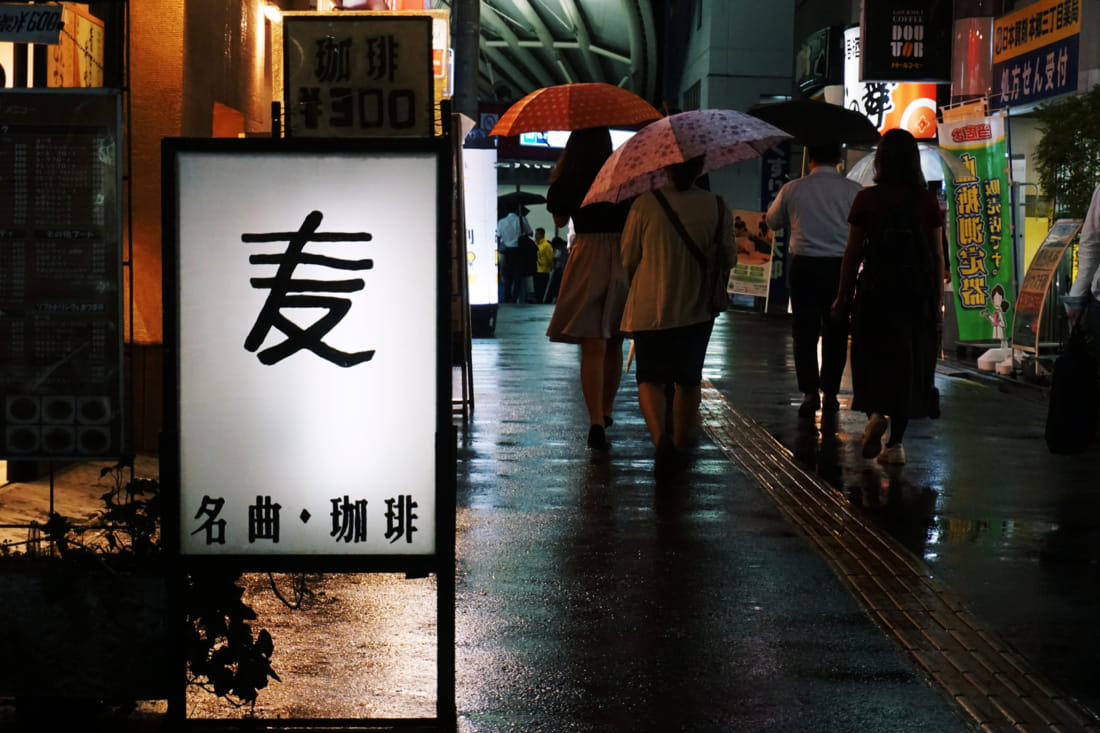
Mugi
Mugi, located in Bunkyo ward, stretches the definition of meikyoku kissa a little. It serves a wider selection of food and the music doesn’t take center stage, but like the other meikyoku kissa, Mugi feels like stepping back in time, and it is certainly a great place to enjoy classical music in a unique space.
The decor in Mugi is much like the others. It is filled with old books and other vintage items. It has dim lighting and posters of classical composers, but what is special about Mugi is that it also serves delicious kissaten food. The food here tastes like home cooking and brings about feelings of nostalgia, even if it’s your first time trying the dish. Looking through the kitchen’s window and watching the friendly older man smile as he is passionately cooking a plate of spaghetti napolitan is certain to make the dish even more tasty. If you are looking to experience meikyoku-kissa culture while having a bite to eat, Mugi won’t let you down.
Find details on our Concierge listing
Feature photo by Andrekart Photography / Shutterstock.com


